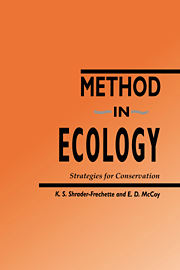Book contents
- Frontmatter
- Contents
- Acknowledgments
- 1 Introduction: What ecology can't do
- 2 Ecological concepts are problematic
- 3 Ecological theory is problematic
- 4 Ecological science is value laden
- 5 What ecology can do: The logic of case studies
- 6 Ecology and a new account of rationality
- 7 Objections to ethical rationality in ecology
- 8 A case study: The Florida panther
- 9 Policy aspects of the Florida-panther case
- 10 Conclusions
- References
- Name index
- Subject index
- Revisions (1993 printing)
2 - Ecological concepts are problematic
Published online by Cambridge University Press: 08 January 2010
- Frontmatter
- Contents
- Acknowledgments
- 1 Introduction: What ecology can't do
- 2 Ecological concepts are problematic
- 3 Ecological theory is problematic
- 4 Ecological science is value laden
- 5 What ecology can do: The logic of case studies
- 6 Ecology and a new account of rationality
- 7 Objections to ethical rationality in ecology
- 8 A case study: The Florida panther
- 9 Policy aspects of the Florida-panther case
- 10 Conclusions
- References
- Name index
- Subject index
- Revisions (1993 printing)
Summary
the queen, in Lewis Carroll's Through the Looking Glass, claimed that she was able to believe six impossible things before breakfast. Unlike the Queen, most of us cannot believe impossible things. We, like Alice, cannot believe that inconsistent definitions of the same term or concept are both true. Often, however, we subscribe to different concepts or definitions without realizing that they are contradictory. Perhaps this occurs because we fail either to trace the logical consequences of our assent to particular beliefs or to recognize the assumptions necessary to our assent.
If community ecology, indeed, any science, is to progress, then we must learn to recognize the ways in which we, like the Queen, “believe impossible things.” One way to achieve such recognition is through clarification of foundational concepts. In fact, clarification of concepts like “community” and “stability” is a necessary condition for having a science that is public, empirical, and testable. Without clarification of and consensus about – such concepts, different ecologists will fail to make logical contact with each other. Instead, they will operate with various “private” ecologies; they will fail to provide authentic replications, confirmations, or falsifications of the findings of other scientists allegedly working on the same problem.
In the Preface to his recent philosophy of biology, Toward a New Philosophy of Biology: Observations of an Evolutionist (1988), and in his earlier Growth of Biological Thought (1982), Ernst Mayr emphasized that recent progress in evolutionary biology is a result of conceptual clarification, not a consequence of improved measurements or better scientific laws.
- Type
- Chapter
- Information
- Method in EcologyStrategies for Conservation, pp. 11 - 67Publisher: Cambridge University PressPrint publication year: 1993

